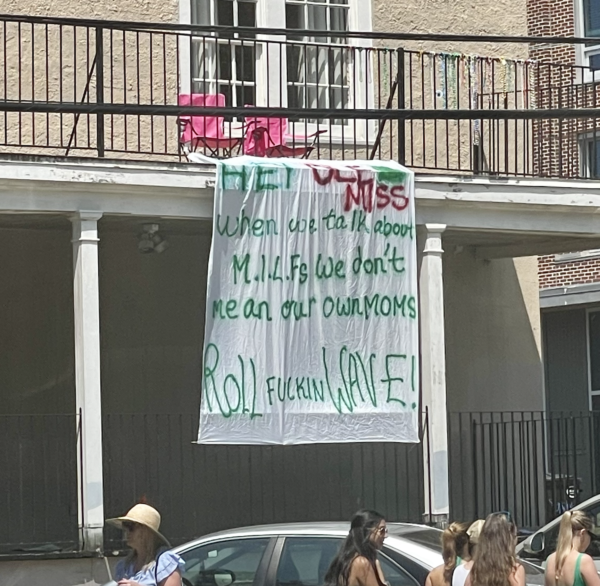
“Hey Ole Miss: when we talk about M.I.L.F.s we don’t mean our own moms … Roll [expletive] WAVE!”
A handful, if not the majority, of Tulane University students and other football fans likely saw this insult on a banner hung on an off-campus house the morning of the Tulane vs. Ole Miss game.
If onlookers did not see this banner as they walked to Yulman Stadium, they most certainly glimpsed others of similar nature at tailgates or in passing. Students also flocked to Fizz, the popular social media app that facilitates anonymous posting, to target Ole Miss.
Gameday insults may seem harmless or even normal on first thought. After all, trash talking is integral in the sports world — whether uttered between opponents on the field or yelled from one fan section to another.
But it’s often the case that the scope of insults in the world of professional sports is limited. Insults typically target individual players and coaches of opposing teams and avoid making claims about opponents based on stereotypes. This self-regulation may occur due to the heightened scrutiny and media attention surrounding professional sports and its participants, players and fans alike.
Insults thrown in college sports, however, reach beyond the talents of players and in some cases, never mention them; like in the case of the Tulane vs. Ole Miss game, game day insults can make entire characterizations about student populations, colleges and universities and even geographic regions.
Many people may find college sports more exciting than professional sports. College sports showcase star talent on teams with loyal fans, and intense rivalries contribute to widely anticipated matchups. Consequently, competition reaches new heights — but should collegiate trash-talking do the same?
Banners directed at Ole Miss students and fans primarily addressed topics like incest, illiteracy, obesity and hygiene: “If you’re fat and toothless, yell ‘Go Rebs!’”; “If you can read this, you’re clearly not an Ole Miss fan”; and “Don’t you Ole Miss your cousins?”
Fizz posts reflected similar ideas, pointing out the University of Mississippi’s high acceptance rate while occasionally adding accusations of far-right political affiliations: “Surprised the Ole Miss fans could read the scoreboard today, I heard they don’t teach you how to read until you’re a senior,” “90 percent acceptance rate into ole miss LMAO” and “I hope Turning Point doesn’t see all the confederate bumper stickers and trump flags and accidentally sit with the Ole Miss crowd.”
Tulane fans may have found these accusations to be amusing digs and impressive uses of the double entendre. But on second thought, is it not odd that as students attending a Southern school, Tulane students thought it appropriate to draw on elitist stereotypes of the South when insulting other Southern students?
It’s no secret that the majority of Tulane undergraduates are not from Louisiana — according to Niche, 86% of Tulane undergraduates hail from out of state. About 13% of Tulane undergraduates are Louisiana natives, but Tulane also pulls significant populations from New York, California, New Jersey, Illinois, Massachusetts, Texas, Pennsylvania, Maryland and Florida.
Compare these figures to the in-state undergraduate population of Ole Miss: 44.6%, according to collegefactual.com. Still, Ole Miss’s undergraduate population also pulls from at least 27 other states.
Given each school’s respective demographics, it seems that at least some of Tulane’s population — much of which is comprised of out-of-state students who originate from affluent families, according to a study by The New York Times — finds it acceptable to draw on stereotypes about the South and its inhabitants when trying to intimidate their football adversaries.
The South is often regarded by outsiders as home to the caricatured southerner who is racist, uneducated, backwards and often white. The trope completely disregards the racial, ethnic and cultural diversity of the South. Half of America’s Black-identifying population lives in the South as of 2019, and southern metropolitan areas are growing increasingly diverse. Some data suggest that New Orleans is more diverse than the U.S. as a whole.
Insults further ignore the fact that trends like low literacy rates are attributed to systemic issues of poverty and incarceration, and that accusations of incest may obscure the presence of sexual abuse within a family.
Tulane’s preferred insults against Southern schools show closed-mindedness and a genuine disregard for the nuanced realities of the South. The greater region Tulane inhabits is, by no means, perfect, but it surely does not resemble what careless banners and social media posts portray it to be. Many Tulane students may say they love the South, but it’s important to keep in mind that the South is not just warm weather, a relatively low cost of living, comfort food and Mardi Gras.
Beyond Southern stereotypes, it isn’t admirable to poke fun at a school for having a higher acceptance rate than our own. Educational elitism, while often accepted in the mainstream, is still a form of prejudice.
Sticks and stones don’t break bones, and in the sports universe, insulting one’s opponent is part of the deal. That being said, insults often say more about the person — or people — speaking than the opponent.
Maybe next time, we can avoid shouting accusations of having sexual relations with one’s cousin from the student section, as was the case in our football games against Ole Miss and University of Southern Mississippi. Cheap digs are a marker of ignorance, and after all, if we’re as intelligent as we claim to be, can’t we think of better insults?


